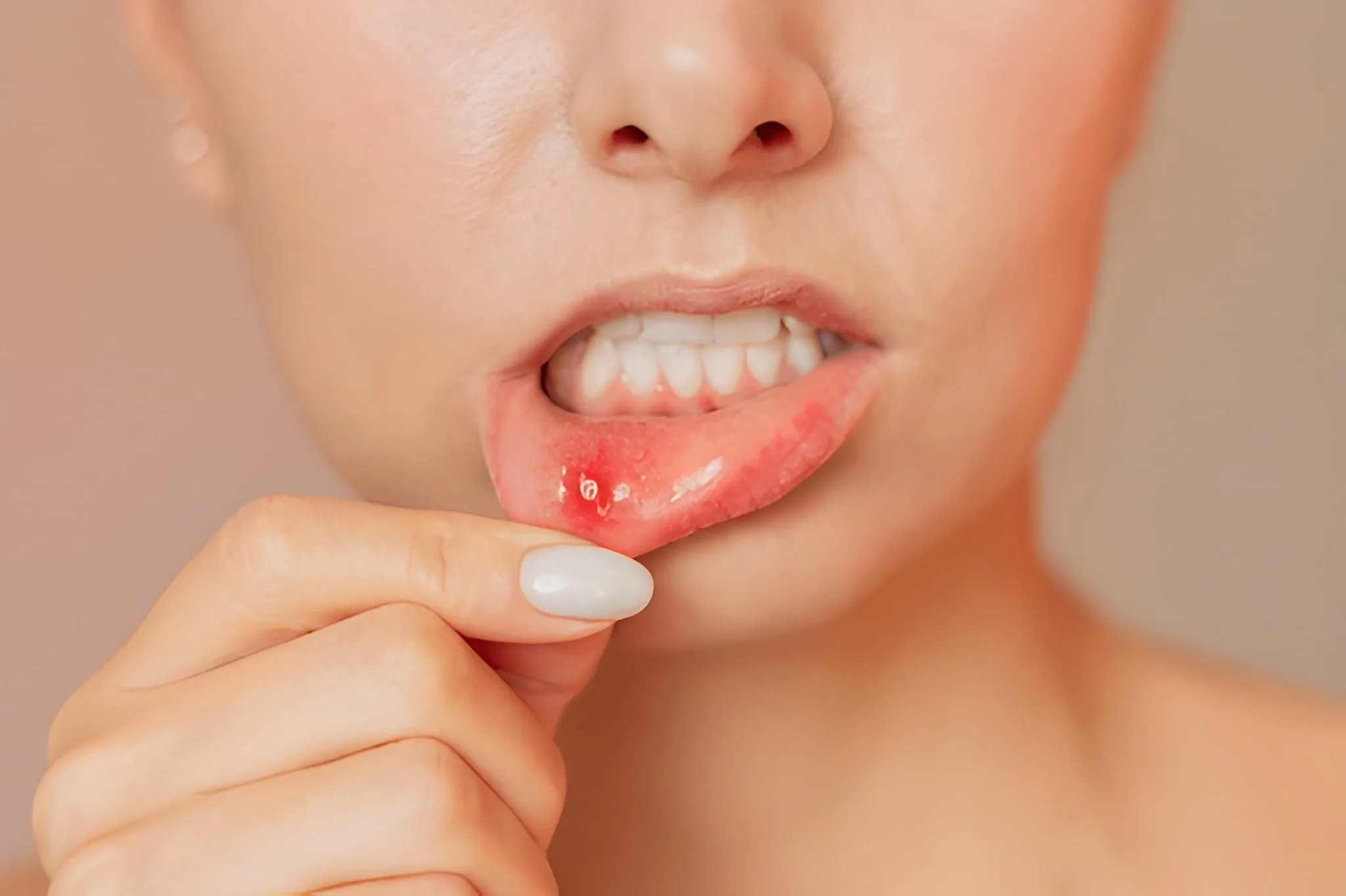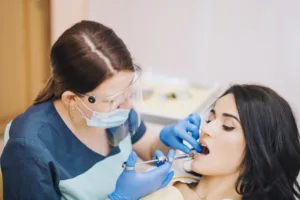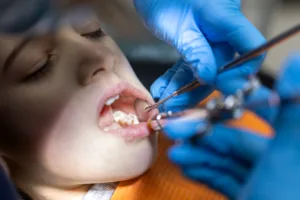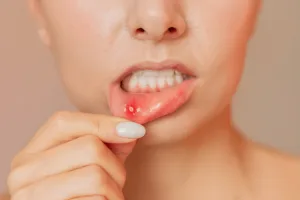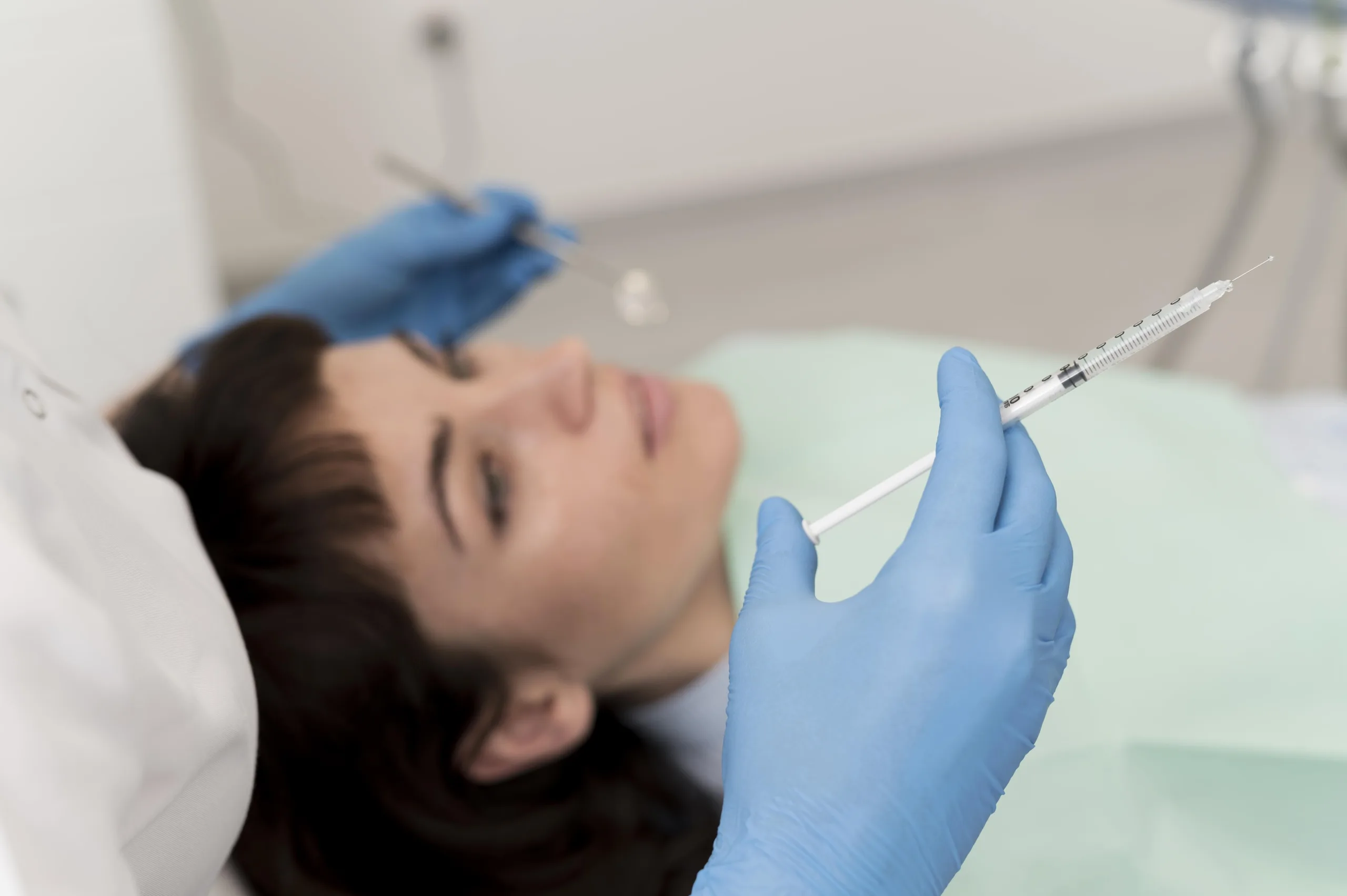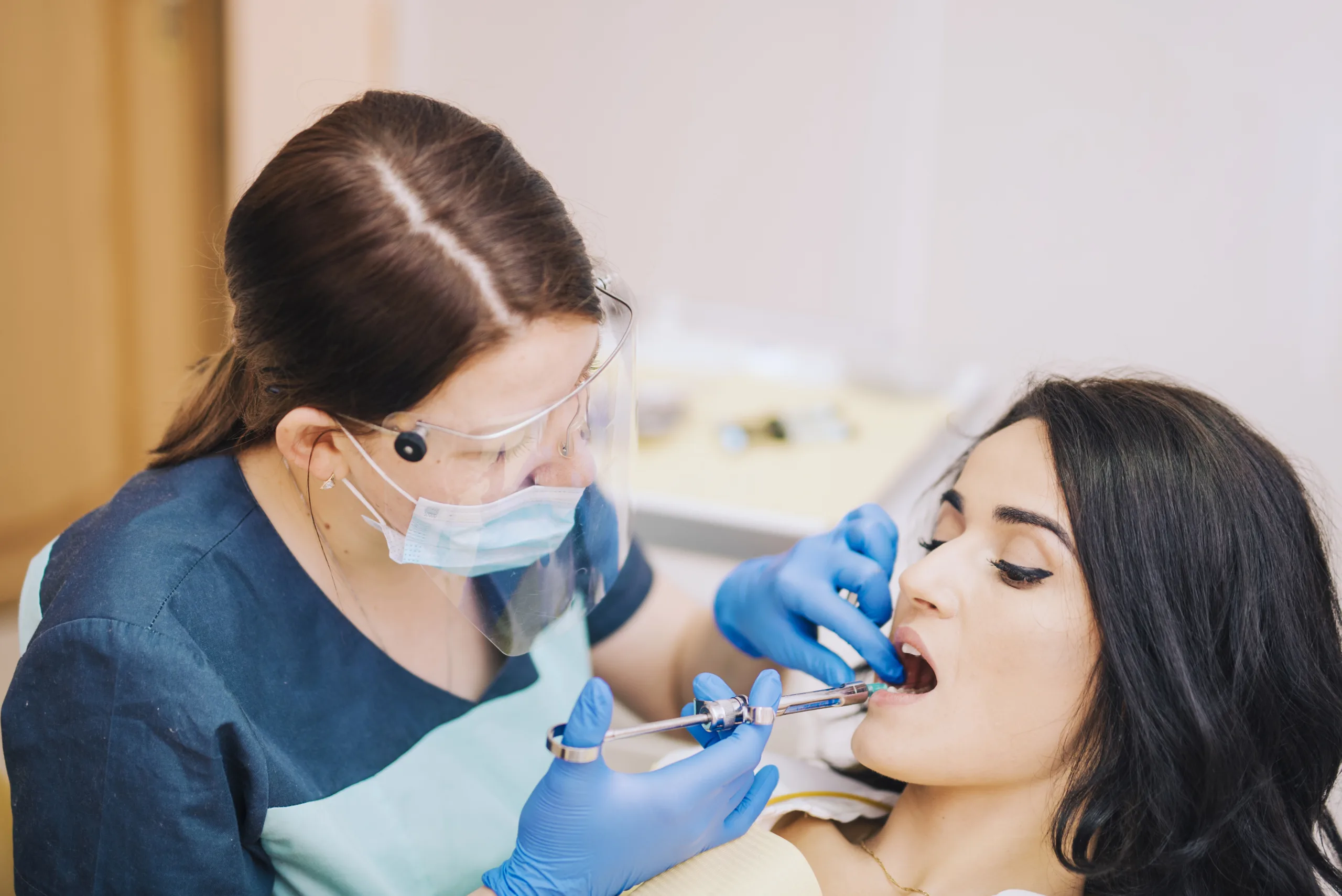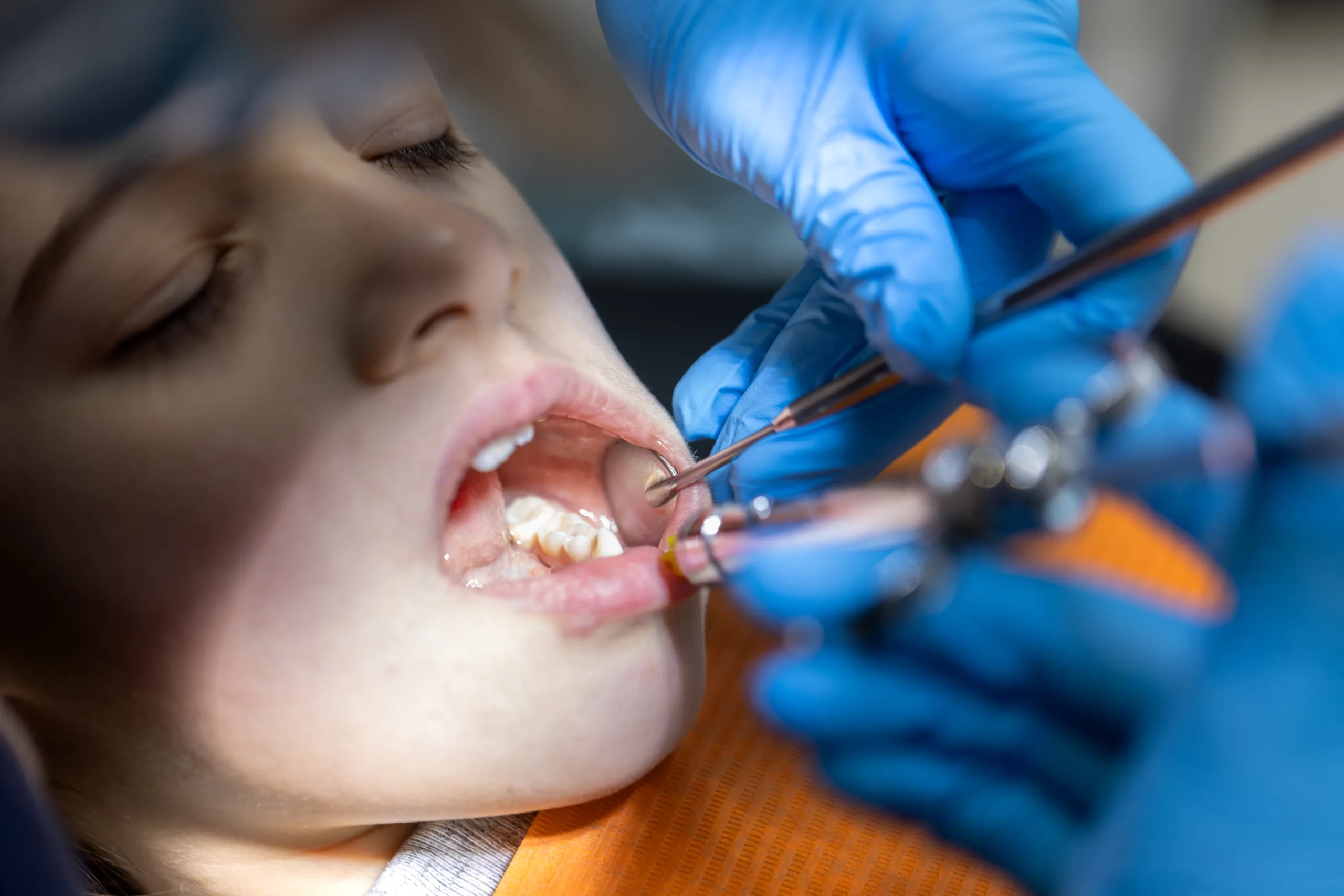While small, a mouth ulcer can feel surprisingly painful and distracting. A mouth ulcer is a shallow sore in the inner lining of your mouth, usually forming on the cheeks, lips, tongue, or gums. Most are harmless and heal on their own, but understanding their causes and proper care can help you manage pain and prevent recurrence.
Table of Contents
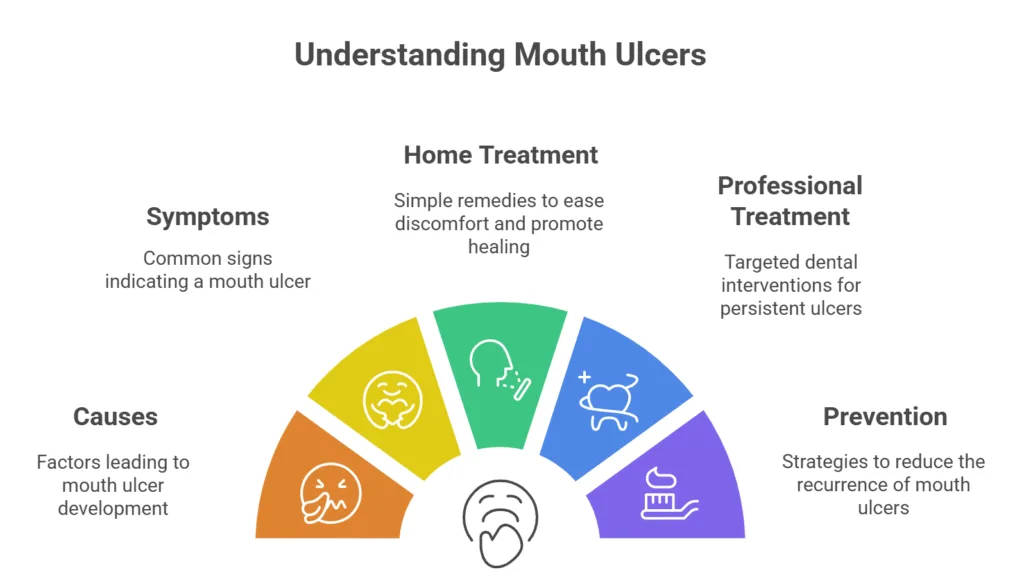
What Causes Mouth Ulcers?
Mouth ulcers are commonly caused by trauma, stress, nutritional deficiencies, or underlying medical conditions.
Several factors can irritate or break the delicate mucous membrane inside the mouth:
Physical Injury (Trauma)
The most common cause of an ulcer is mechanical injury to the mouth tissue. This happens when you accidentally:
- Bite the inside of your cheek or tongue.
- Slip while brushing your teeth with a toothbrush.
- Experience constant rubbing from ill-fitting dentures, braces, or a sharp, broken tooth edge.
- Burn your mouth by eating or drinking overly hot food.
Aphthous Ulcers (Canker Sores)
This is a specific, non-contagious type of ulcer that recurs regularly. Aphthous ulcers, often called canker sores, affect about 20% of the population. They typically appear on the softer tissues of the mouth, such as the inside of the lips, cheeks, the sides of the tongue, and the floor of the mouth. While a definitive cause is often unknown, they are frequently linked to:
- Stress or extreme fatigue.
- Underlying deficiencies in Vitamin B, folate, or iron.
- Genetic predisposition.
Other Health-Related Factors
Ulcers can also be a symptom of a larger issue, including:
- Infections: Viral infections, such as the Herpes Simplex virus (causing cold sores), or fungal infections.
- Medical Conditions: Autoimmune disorders or gastrointestinal diseases like Coeliac disease or Crohn’s disease.
- Medication Reactions: Reactions to certain medications or strong antiseptic mouthwashes.
Important: An ulcer that hasn’t healed after 14 days should be examined by a dentist—especially for smokers or regular alcohol drinkers—as persistent ulcers can sometimes indicate early mouth cancer.
What Are the Common Symptoms of Mouth Ulcers?
Most mouth ulcers appear as small, painful sores that make eating and speaking uncomfortable.
Typical signs include:
- A round or oval sore with a white or yellow centre
- Red or inflamed borders
- Pain when brushing, eating, or talking
- Burning or stinging sensation with salty, spicy, or sour foods
How Do You Treat Mouth Ulcers at Home?
Most mouth ulcers heal naturally within 10–14 days, but simple home remedies can ease discomfort and protect the area.
Effective home treatments include:
- Avoid irritants: Skip spicy, salty, hot, or acidic foods.
- Warm saltwater rinses: Hold the rinse for 30–60 seconds and repeat 3–4 times daily.
- Gentle brushing: Use a soft-bristled toothbrush to prevent further irritation.
- Antiseptic gels: Apply OTC protective or numbing gels to reduce friction and bacteria.
- Maintain oral hygiene: Keep the mouth clean without brushing aggressively.
What Is the Best Professional Treatment for Mouth Ulcers?
Dentists can provide targeted treatment for large, persistent, or frequently recurring ulcers.
A dental professional may recommend:
- Medicated mouthwash: Alcohol-free formulas (e.g., chlorhexidine) help reduce inflammation.
- Topical steroids: To control swelling and pain in severe aphthous ulcers.
- Deficiency tests: Blood tests for Vitamin B, iron, or folate if nutritional causes are suspected.
- Dental appliance adjustments: Smoothing rough edges or correcting denture/braces fit.
When Should You See a Dentist for a Mouth Ulcer?
Seek dental care if an ulcer lasts longer than 10–14 days or keeps returning. A non-healing ulcer, especially in individuals who smoke or consume alcohol regularly, requires prompt evaluation to rule out more serious conditions.
How Long Do Mouth Ulcers Take to Heal?
Most ulcers heal within 10 to 14 days depending on the cause and irritation level. If healing takes longer, the underlying issue may be nutritional, traumatic, or medical—your dentist can help identify the cause.
Can Stress Cause Mouth Ulcers?
Yes. Stress and lack of sleep are major triggers for recurrent mouth ulcers. Improving your sleep routine, reducing stress, and following a balanced diet can significantly reduce flare-ups.
How Can You Prevent Mouth Ulcers From Coming Back?
You can prevent many ulcers by reducing trauma, improving oral care, and supporting overall health.
Helpful prevention tips include:
- Brushing gently with a soft toothbrush
- Eating a nutrient-rich, balanced diet
- Avoiding sharp or irritating foods
- Managing stress and fatigue
- Ensuring braces or dentures fit properly
- Scheduling routine dental check-ups
Concerned About a Persistent Mouth Ulcer?
If you’re experiencing frequent or non-healing mouth ulcers, don’t hesitate to reach out to Richmond & Springvale Dental Group. With convenient locations in Abbotsford and Springvale, our experienced team is here to help diagnose the cause and provide the most effective treatment plan for a healthy, comfortable smile.
Book your appointment today and protect your long-term oral health.

